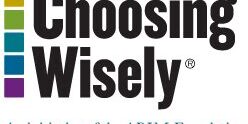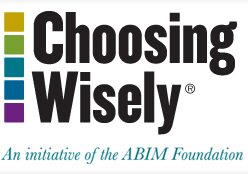George A. Fritsma, MS, MLS(ASCP)CM
In February of 2017, George Fritsma and the late Cindy Johns led a Clinical Laboratory Educators Conference (CLEC) plenary session entitled, “Enhancing Laboratory Communication to Reduce Extra-analytical Errors.” The presenters referred to the American Board of Internal Medicine (ABIM) Foundation’s Choosing Wisely® (CW) initiative, founded with Consumer Reports in 2012. CW “seeks to advance a national dialogue on avoiding unnecessary medical tests, treatments, and procedures.” All CW recommendations, now over 500, begin with the words, “Do not,” or “Avoid.”
Following the CLEC session, the speakers met with then-president Suzanne Campbell and ASCLS Executive Vice President Jim Flanigan to discuss engaging ASCLS members’ technical expertise to develop lab-related CW recommendations. At the August 2017 ASCLS Annual Meeting, the ASCLS Board of Directors agreed to form a CW Task Force, uniting nine ASCLS members representing the medical laboratory science disciplines clinical chemistry, microbiology, immunology, immunohematology, molecular diagnostics, hematology, hemostasis, and laboratory administration.
The task force generated a series of prospective recommendations that several members presented at the February 2018 CLEC. The presentation drew additional recommendations, which the task force formalized and presented to their respective scientific assembly sections at the August 2018 ASCLS Annual Meeting. The task force subsequently presented the first slate of recommendations for review by the ASCLS Board of Directors (BOD) in the Spring of 2019. In the fall of 2019, the ASCLS BOD elevated the task force to standing committee status, and the new committee now has 11 members, [see Table 1] not counting our BOD Liaison Stephanie Mihane, ASCLS President Cindy Johnson, and EVP Jim Flanigan.
As we prepared our recommendations for the ABIM Foundation, the American Society for Clinical Pathology (ASCP) invited us to collaborate with its Committee on Science, Technology, and Policy (CSTP), which has worked with the ABIM Foundation since 2012. The collaboration gave us additional authority and smoothed the submission process. CSTP also incorporates the ASCLS CW Committee into its own recommendation review process and adds the opportunity to review submissions from fellow collaborator American Society for Microbiology (ASM). The ASCLS recommendations went forward to the ABIM Foundation, who submitted them for review to all the agencies that contribute to the CW site. Our ASCLS recommendations were accepted by the ABIM Foundation and published on June 10, 2020, accompanied by a joint press release provided by ASCLS, ASCP, and the ABIM Foundation.
The ASCLS recommendations are:
- Do not order a factor V Leiden (FVL) mutation assay as the initial test to identify a congenital cause for a thrombotic event. First, order a phenotypic activated protein C resistance (APCR) ratio assay.
- Do not use herpes simplex virus (HSV) polymerase chain reaction (PCR) testing for genital HSV infection screening in adults and adolescents. Real-time HSV PCR testing should only be used to confirm herpes diagnosis in patients with suspected herpes.
- Do not transfuse red blood cells as the sole intervention for expansion of circulatory volume unless deemed necessary for patients experiencing severe hemorrhage.
- Avoid using hemoglobin to evaluate patients for iron deficiency in susceptible populations. Instead use ferritin.
- Do not order a comprehensive stool ova and parasite (O&P) microscopic exam on patients presenting with diarrhea less than seven days’ duration who have no immunodeficiency or no history of living in or traveling to endemic areas where gastrointestinal parasitic infections are prevalent. If symptoms of infectious diarrhea persist for seven days or longer, start with molecular or antigen testing and next consider a full O&P microscopic exam if other testing is negative.
You can review these recommendations with clarifying discussions and references by visiting www.choosingwisely.org.
Besides our technical expertise, ASCLS medical laboratory science educators bring a new dimension, as several have developed CW educational modules. These are offered in classrooms and online for undergraduate and graduate MLS students, physician assistant and nurse practitioner programs, entry-level nursing programs, and pathology residents. Entry level concepts typically exert great influence on clinical practice.
While our initial process proceeded, the committee continued to accept and develop new recommendations from the membership. These are now being processed through the scientific assembly sections and will eventually go to the ASCLS BOD for our next submission. You can find these in our ASCLS Connect communities. Meanwhile, we invite you to share your recommendations, remembering that they always begin with “avoid,” or “do not.”
George Fritsma is proprietor of The Fritsma Factor, Your Interactive Hemostasis Resource, and lives near Birmingham, Alabama.
Table 1 ASCLS Choosing Wisely® Committee
| Name | Credentials | Location | Specialty |
|---|---|---|---|
| Lisa Cremeans | MMDS, MLS(ASCP)CMSMCMMBCM | University of North Carolina, Chapel Hill | Microbiology, Molecular |
| Josephine Ebomoyi | PhD, MSPH, M(ASCP) | Northern Illinois University, DeKalb | Microbiology |
| Muneeza Esani | PhD, MPH, MT(ASCP) | University of TX Medical Branch, Galveston | Clin Chemistry |
| George Fritsma | MS, MLS(ASCP)CM | University of Alabama at Birmingham | Heme, Coag |
| Deborah Josko | PhD, MT(ASCP),SM | Director, MLS Program, Rutgers University | Immunology |
| Brianna Miller | MS, MLS(ASCP)CM | University of Alabama at Birmingham | Heme, Coag, BB |
| Ryan Mize | DCLS | Special Coag Manager Mass General | Heme, Coag |
| Rick Panning | MBA, MLS(ASCP)CM | HealthPartners, Minnesota | Lab Management |
| Dawn Rudnik | MT(ASCP),SM | University of Michigan Health Services Lab Manager | Microbiology, General |
| Mayukh Sarkar | PhD, MLS(ASCP)CM | Wisconsin Diagnostic Laboratories | Coag |
| John Smith | MS, MLS(ASCP)CM | Retired, Kansas | Micro, Health Care Usage |

